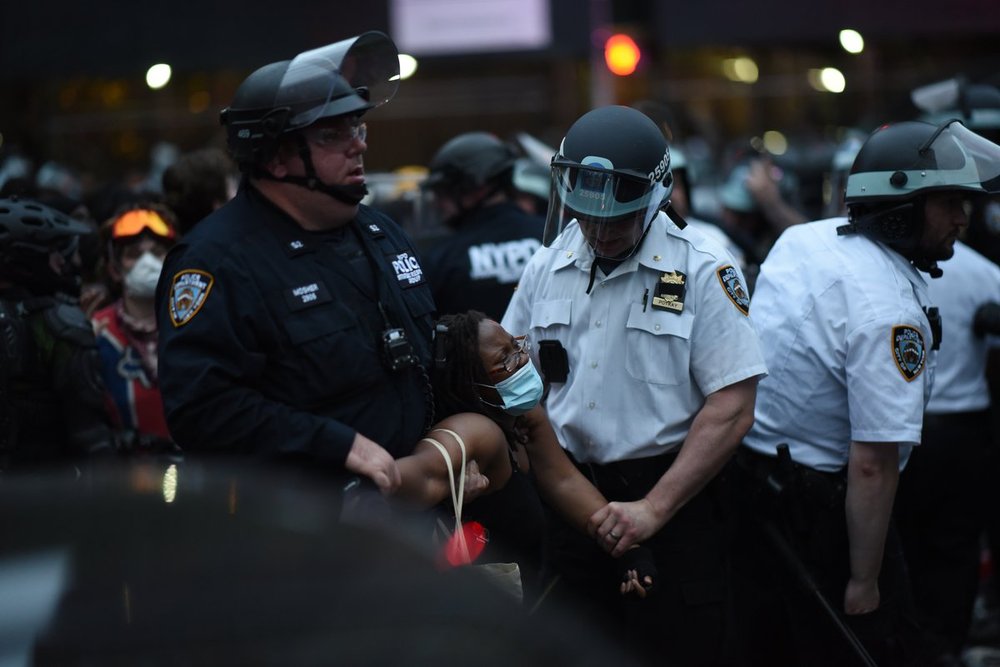City Council Votes To Give CCRB Power To Self-Initiate Investigations Into Police Misconduct
Dec. 9, 2021, 7:59 p.m.
Previously, city rules forced the agency to wait until receiving a formal complaint before launching an investigation.

New York City’s City Council voted on Thursday to authorize the Civilian Complaint Review Board (CCRB), a police watchdog agency, to launch its own probes into potential NYPD misconduct.
The bill’s sponsor, Council Member Adrienne Adams of Queens, called it long-overdue and commonsense legislation.
“As the nation’s largest civilian oversight agency, the CCRB has the important responsibility of looking into and issuing finding for bad behavior, including excessive use of force, abuse of authority, biased based policing and racial profiling. Enhancing their authority will lead to greater accountability when it comes to public safety,” Adams said.
Previously, city rules forced the agency to wait until receiving a formal complaint before launching an investigation. Before the vote, agency officials argued that this process was outmoded, noting that their investigators are unable to act on troubling videos of police conduct circulating on social media.
Danielle Filson, spokesperson for the mayor’s office, indicated that Mayor Bill de Blasio would sign the bill. “This administration has fought and advocated to strengthen the CCRB and civilian oversight of the NYPD,” she said. “We strongly support this bill.”
The NYPD did not respond to questions submitted by Gothamist/WNYC about the bill.
I'm proud that @NYCCouncil has just passed Intro. 2440, my bill to empower @CCRB_NYC to initiate complaints and investigations into alleged police misconduct. This long overdue legislation will lead to greater accountability and public safety for all New Yorkers. pic.twitter.com/sLvk2jIKO7
— Adrienne Adams (@AdrienneEAdams1) December 9, 2021
The CCRB estimates that roughly 500 more investigations will be launched per year with this power.
“After years of work, the CCRB has finally been granted the power to self-initiate complaints,” said Rev. Frederick Davie, the agency’s chairperson, in a statement thanking lawmakers. “Police misconduct should not go ignored because a victim does not have the capacity to file a complaint. This much needed reform is a crucial step in improving police accountability.”
The vote is the latest in a string of victories for the CCRB, which critics have long cast as ineffectual due to its limited staff size and authority, and reliance on the NYPD for key investigative processes.
Last February, the agency gained the power to investigate officers accused of sexual misconduct. At its December board meeting on Wednesday, the CCRB said it had so far substantiated 28 allegations against 23 officers, but that the NYPD had only issued penalties against 14 of them and that, in several cases, the police department had downgraded the disciplinary action recommended by the board.
In one case, the CCRB substantiated a sexual humiliation charge against a group of officers accused of leaving a burglary suspect on the floor of a Duane Reade for eight minutes with his pants lowered to his knees, exposing his buttocks and genitals, while officers could be seen smiling and laughing. However, the NYPD declined to levy the serious departmental charges that the CCRB had recommended, arguing there was no evidence showing the officers had deliberately tried to expose the man in public or that their laughter was directed at him. Instead, it gave a sergeant on the scene a minor internal punishment for failing to render services with courtesy and civility.
At the city council meeting, lawmakers also passed a bill that would ban the NYPD from hiring police officers fired for misconduct at other police departments. In a statement, NYPD Sergeant Edward Riley noted that the department itself supported this change.
“It has been our long-standing practice not to hire individuals who have been dismissed from other police departments for misconduct and such, we are already in compliance with this law,” he said.
Davie, at the CCRB’s meeting on Wednesday, emphasized the agency’s other legislative priorities as the city prepares for Eric Adams to be sworn in as mayor in January, which include calls for the board to be allowed to make decisions on what type of discipline officers face when complaints are substantiated against them. That power is currently held by the NYPD’s commissioner, a fact that critics of the CCRB’s structure have long said limits its ability to hold police accountable.
“It is key that the mayor and the incoming administration support the CCRB in expanding the CCRB to include final disciplinary authority,” Davie said.